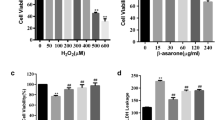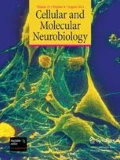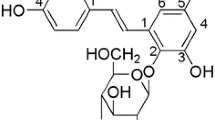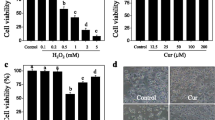Abstract
Neurodegenerative diseases all share several common features such as involvement of oxidative damage and mitochondrial dysfunction in pathogenesis. Oxidative stress induced by overproduction of mitochondrial reactive oxygen species (ROS) or impairment of the antioxidant deficiency results in mitochondrial dysfunction and initiation of the cell death cascade. Berberine (BBR), a traditional Chinese medicine, has been reported to exert anti-oxidative stress and anti-apoptosis effect in CNS diseases. However, the mechanism of BBR on regulating mitophagy and protecting mitochondrial function under oxidative stress remains unclear. In present study, we evaluated the beneficial effects of BBR on the tert-butyl hydroperoxide (t-BHP)-induced cytotoxicity. Furthermore, we explored the protective role of BBR in mitochondrial function and mitophagy under oxidative stress in PC-12 cells. Our results demonstrated that BBR effectively inhibited t-BHP-induced apoptosis which is associated with the decreased leakage of lactate dehydrogenase (LDH) and ROS overproduction. Moreover, BBR significantly suppressed cytochrome c expression, upregulated the ratio of Bcl-2/Bax, and ameliorated mitochondrial dysfunction by optimizing mitochondria membrane potential (ΔΨm) status and ATP production. In addition, BBR reduced the expression of autophagy-specific marker LC3, SQTM1/p62, and maintained lysosome normal function which involved the restoration of upstream signaling pathway AKT and mTOR phosphorylation level. Collectively, these findings suggested that BBR protects PC-12 cells from oxidative injury through inhibiting ROS level, mitochondria dysfunction, and mitophagy via PI3K/AKT/mTOR signaling pathways, which suggest a potential therapeutic strategy for oxidative stress and neurotoxic damages.








Similar content being viewed by others

References
Abuarab N, Munsey TS, Jiang LH, Li J, Sivaprasadarao A (2017) High glucose-induced ROS activates TRPM2 to trigger lysosomal membrane permeabilization and Zn(2+)-mediated mitochondrial fission. Science Signal 10(490):eaal4161. https://doi.org/10.1126/scisignal.aal4161
Bae J, Lee D, Kim YK, Gil M, Lee JY, Lee KJ (2013) Berberine protects 6-hydroxydopamine-induced human dopaminergic neuronal cell death through the induction of heme oxygenase-1. Mol Cells 35(2):151–157. https://doi.org/10.1007/s10059-013-2298-5
Baechler BL, Bloemberg D, Quadrilatero J (2019) Mitophagy regulates mitochondrial network signaling, oxidative stress, and apoptosis during myoblast differentiation. Autophagy. https://doi.org/10.1080/15548627.2019.1591672
Campisi A, Acquaviva R, Mastrojeni S, Raciti G, Vanella A, De Pasquale R, Puglisi S, Iauk L (2011) Effect of berberine and Berberis aetnensis C. Presl. alkaloid extract on glutamate-evoked tissue transglutaminase up-regulation in astroglial cell cultures. Phytother Res PTR 25(6):816–820. https://doi.org/10.1002/ptr.3340
Carloni S, Girelli S, Scopa C, Buonocore G, Longini M, Balduini W (2010) Activation of autophagy and Akt/CREB signaling play an equivalent role in the neuroprotective effect of rapamycin in neonatal hypoxia-ischemia. Autophagy 6(3):366–377
Carroll B, Otten EG, Manni D, Stefanatos R, Menzies FM, Smith GR, Jurk D, Kenneth N, Wilkinson S, Passos JF, Attems J, Veal EA, Teyssou E, Seilhean D, Millecamps S, Eskelinen EL, Bronowska AK, Rubinsztein DC, Sanz A, Korolchuk VI (2018) Oxidation of SQSTM1/p62 mediates the link between redox state and protein homeostasis. Nat Commun 9(1):256. https://doi.org/10.1038/s41467-017-02746-z
Caspersen C, Wang N, Yao J, Sosunov A, Chen X, Lustbader JW, Xu HW, Stern D, McKhann G, Yan SD (2005) Mitochondrial Abeta: a potential focal point for neuronal metabolic dysfunction in Alzheimer’s disease. FASEB J 19(14):2040–2041. https://doi.org/10.1096/fj.05-3735fje
Chen Y, Azad MB, Gibson SB (2009) Superoxide is the major reactive oxygen species regulating autophagy. Cell Death Differ 16(7):1040–1052. https://doi.org/10.1038/cdd.2009.49
Cheng F, Wang Y, Li J, Su C, Wu F, Xia WH, Yang Z, Yu BB, Qiu YX, Tao J (2013) Berberine improves endothelial function by reducing endothelial microparticles-mediated oxidative stress in humans. Int J Cardiol 167(3):936–942. https://doi.org/10.1016/j.ijcard.2012.03.090
Choubey V, Safiulina D, Vaarmann A, Cagalinec M, Wareski P, Kuum M, Zharkovsky A, Kaasik A (2011) Mutant A53T alpha-synuclein induces neuronal death by increasing mitochondrial autophagy. J Biol Chem 286(12):10814–10824. https://doi.org/10.1074/jbc.M110.132514
Fukuda T, Ewan L, Bauer M, Mattaliano RJ, Zaal K, Ralston E, Plotz PH, Raben N (2006) Dysfunction of endocytic and autophagic pathways in a lysosomal storage disease. Ann Neurol 59(4):700–708. https://doi.org/10.1002/ana.20807
Ganzleben I, He GW, Gunther C, Prigge ES, Richter K, Rieker RJ, Mougiakakos D, Neurath MF, Becker C (2019) PGAM5 is a key driver of mitochondrial dysfunction in experimental lung fibrosis. Cell Mol Life Sci. https://doi.org/10.1007/s00018-019-03133-1
Gustafsson AB, Dorn GW 2nd (2019) Evolving and expanding the roles of mitophagy as a homeostatic and pathogenic process. Physiol Rev 99(1):853–892. https://doi.org/10.1152/physrev.00005.2018
Hao Y, Liu HM, Wei X, Gong X, Lu ZY, Huang ZH (2019) Diallyl trisulfide attenuates hyperglycemia-induced endothelial apoptosis by inhibition of Drp1-mediated mitochondrial fission. Acta Diabetol. https://doi.org/10.1007/s00592-019-01366-x
He X, Yuan W, Li Z, Feng J (2017) An autophagic mechanism is involved in the 6-hydroxydopamine-induced neurotoxicity in vivo. Toxicol Lett 280:29–40. https://doi.org/10.1016/j.toxlet.2017.08.006
Hibaoui Y, Roulet E, Ruegg UT (2009) Melatonin prevents oxidative stress-mediated mitochondrial permeability transition and death in skeletal muscle cells. J Pineal Res 47(3):238–252. https://doi.org/10.1111/j.1600-079X.2009.00707.x
Hsu P, Liu X, Zhang J, Wang HG, Ye JM, Shi Y (2015) Cardiolipin remodeling by TAZ/tafazzin is selectively required for the initiation of mitophagy. Autophagy 11(4):643–652. https://doi.org/10.1080/15548627.2015.1023984
Jaafaru MS, Nordin N, Rosli R, Shaari K, Bako HY, Noor NM, Abdull Razis AF (2019) Prospective role of mitochondrial apoptotic pathway in mediating GMG-ITC to reduce cytotoxicity in H2O2-induced oxidative stress in differentiated SH-SY5Y cells. Biomed Pharmacother 119:109445. https://doi.org/10.1016/j.biopha.2019.109445
Kiselyov K, Jennigs JJ Jr, Rbaibi Y, Chu CT (2007) Autophagy, mitochondria and cell death in lysosomal storage diseases. Autophagy 3(3):259–262
Kou JY, Li Y, Zhong ZY, Jiang YQ, Li XS, Han XB, Liu ZN, Tian Y, Yang LM (2017) Berberine-sonodynamic therapy induces autophagy and lipid unloading in macrophage. Cell Death Dis 8(1):e2558. https://doi.org/10.1038/cddis.2016.354
Lamberti G, Brighi N, Maggio I, Manuzzi L, Peterle C, Ambrosini V, Ricci C, Casadei R, Campana D (2018) The role of mTOR in neuroendocrine tumors: future cornerstone of a winning strategy? Int J Mol Sci 19(3):747. https://doi.org/10.3390/ijms19030747
Lawrence RE, Zoncu R (2019) The lysosome as a cellular centre for signalling, metabolism and quality control. Nat Cell Biol 21(2):133–142. https://doi.org/10.1038/s41556-018-0244-7
Li L, Tan J, Miao Y, Lei P, Zhang Q (2015a) ROS and autophagy: interactions and molecular regulatory mechanisms. Cell Mol Neurobiol 35(5):615–621. https://doi.org/10.1007/s10571-015-0166-x
Li W, Hua B, Saud SM, Lin H, Hou W, Matter MS, Jia L, Colburn NH, Young MR (2015b) Berberine regulates AMP-activated protein kinase signaling pathways and inhibits colon tumorigenesis in mice. Mol Carcinog 54(10):1096–1109. https://doi.org/10.1002/mc.22179
Li H, Tang Z, Chu P, Song Y, Yang Y, Sun B, Niu M, Qaed E, Shopit A, Han G, Ma X, Peng J, Hu M, Tang Z (2018a) Neuroprotective effect of phosphocreatine on oxidative stress and mitochondrial dysfunction induced apoptosis in vitro and in vivo: involvement of dual PI3K/Akt and Nrf2/HO-1 pathways. Free Radic Biol Med 120:228–238. https://doi.org/10.1016/j.freeradbiomed.2018.03.014
Li J, Wang Q, Cai H, He Z, Wang H, Chen J, Zheng Z, Yin J, Liao Z, Xu H, Xiao J, Gong F (2018b) FGF1 improves functional recovery through inducing PRDX1 to regulate autophagy and anti-ROS after spinal cord injury. J Cell Mol Med 22(5):2727–2738. https://doi.org/10.1111/jcmm.13566
Li S, Gaur U, Chong CM, Lin S, Fang J, Zeng Z, Wang H, Zheng W (2018c) Berberine protects human retinal pigment epithelial cells from hydrogen peroxide-induced oxidative damage through activation of AMPK. Int J Mol Sci 19(6):1736. https://doi.org/10.3390/ijms19061736
Lu SS, Yu YL, Zhu HJ, Liu XD, Liu L, Liu YW, Wang P, Xie L, Wang GJ (2009) Berberine promotes glucagon-like peptide-1 (7-36) amide secretion in streptozotocin-induced diabetic rats. J Endocrinol 200(2):159–165. https://doi.org/10.1677/joe-08-0419
Lu J, Cao Y, Cheng K, Xu B, Wang T, Yang Q, Yang Q, Feng X, Xia Q (2015) Berberine regulates neurite outgrowth through AMPK-dependent pathways by lowering energy status. Exp Cell Res 334(2):194–206. https://doi.org/10.1016/j.yexcr.2015.04.006
Ma X, Chen Z, Wang L, Wang G, Wang Z, Dong X, Wen B, Zhang Z (2018) The pathogenesis of diabetes mellitus by oxidative stress and inflammation: its inhibition by Berberine. Front in Pharmacol 9:782. https://doi.org/10.3389/fphar.2018.00782
Mo C, Wang L, Zhang J, Numazawa S, Tang H, Tang X, Han X, Li J, Yang M, Wang Z, Wei D, Xiao H (2014) The crosstalk between Nrf2 and AMPK signal pathways is important for the anti-inflammatory effect of berberine in LPS-stimulated macrophages and endotoxin-shocked mice. Antioxid Redox Signal 20(4):574–588. https://doi.org/10.1089/ars.2012.5116
Nagakannan P, Eftekharpour E (2017) Differential redox sensitivity of cathepsin B and L holds the key to autophagy-apoptosis interplay after Thioredoxin reductase inhibition in nutritionally stressed SH-SY5Y cells. Free Radic Biol Med 108:819–831. https://doi.org/10.1016/j.freeradbiomed.2017.05.005
Pan T, Kondo S, Le W, Jankovic J (2008) The role of autophagy-lysosome pathway in neurodegeneration associated with Parkinson’s disease. Brain 131(Pt 8):1969–1978. https://doi.org/10.1093/brain/awm318
Pan Y, Wang N, Xia P, Wang E, Guo Q, Ye Z (2017) Inhibition of Rac1 ameliorates neuronal oxidative stress damage via reducing Bcl-2/Rac1 complex formation in mitochondria through PI3K/Akt/mTOR pathway. Exp Neurol. https://doi.org/10.1016/j.expneurol.2017.10.030
Papa L, Rockwell P (2008) Persistent mitochondrial dysfunction and oxidative stress hinder neuronal cell recovery from reversible proteasome inhibition. Apoptosis 13(4):588–599. https://doi.org/10.1007/s10495-008-0182-0
Pi H, Xu S, Zhang L, Guo P, Li Y, Xie J, Tian L, He M, Lu Y, Li M, Zhang Y, Zhong M, Xiang Y, Deng L, Zhou Z, Yu Z (2013) Dynamin 1-like-dependent mitochondrial fission initiates overactive mitophagy in the hepatotoxicity of cadmium. Autophagy 9(11):1780–1800. https://doi.org/10.4161/auto.25665
Pompura SL, Dominguez-Villar M (2018) The PI3K/AKT signaling pathway in regulatory T-cell development, stability, and function. J Leukoc Biol. https://doi.org/10.1002/jlb.2mir0817-349r
Poprac P, Jomova K, Simunkova M, Kollar V, Rhodes CJ, Valko M (2017) Targeting free radicals in oxidative stress-related human diseases. Trends Pharmacol Sci 38(7):592–607. https://doi.org/10.1016/j.tips.2017.04.005
Sansanwal P, Yen B, Gahl WA, Ma Y, Ying L, Wong LJ, Sarwal MM (2010) Mitochondrial autophagy promotes cellular injury in nephropathic cystinosis. J Am Soc Nephrol 21(2):272–283. https://doi.org/10.1681/asn.2009040383
Scherz-Shouval R, Elazar Z (2011) Regulation of autophagy by ROS: physiology and pathology. Trends Biochem Sci 36(1):30–38. https://doi.org/10.1016/j.tibs.2010.07.007
Shen YQ, Guerra-Librero A, Fernandez-Gil BI, Florido J, Garcia-Lopez S, Martinez-Ruiz L, Mendivil-Perez M, Soto-Mercado V, Acuna-Castroviejo D, Ortega-Arellano H, Carriel V, Diaz-Casado ME, Reiter RJ, Rusanova I, Nieto A, Lopez LC, Escames G (2018) Combination of melatonin and rapamycin for head and neck cancer therapy: Suppression of AKT/mTOR pathway activation, and activation of mitophagy and apoptosis via mitochondrial function regulation. J Pineal Res 64(3):e12461. https://doi.org/10.1111/jpi.12461
Sies H (2017) Hydrogen peroxide as a central redox signaling molecule in physiological oxidative stress: oxidative eustress. Redox Biol 11:613–619. https://doi.org/10.1016/j.redox.2016.12.035
Singh-Mallah G, Nair S, Sandberg M, Mallard C, Hagberg H (2019) The role of mitochondrial and endoplasmic reticulum reactive oxygen species production in models of perinatal brain injury. Antioxid Redox Signal. https://doi.org/10.1089/ars.2019.7779
Stokman G, Kors L, Bakker PJ, Rampanelli E, Claessen N, Teske GJD, Butter L, van Andel H, van den Bergh Weerman MA, Larsen PWB, Dessing MC, Zuurbier CJ, Girardin SE, Florquin S, Leemans JC (2017) NLRX1 dampens oxidative stress and apoptosis in tissue injury via control of mitochondrial activity. J Exp Med 214(8):2405–2420. https://doi.org/10.1084/jem.20161031
Sun Y, Yuan X, Zhang F, Han Y, Chang X, Xu X, Li Y, Gao X (2017) Berberine ameliorates fatty acid-induced oxidative stress in human hepatoma cells. Sci Rep 7(1):11340. https://doi.org/10.1038/s41598-017-11860-3
Tang Q, Zheng G, Feng Z, Chen Y, Lou Y, Wang C, Zhang X, Zhang Y, Xu H, Shang P, Liu H (2017) Trehalose ameliorates oxidative stress-mediated mitochondrial dysfunction and ER stress via selective autophagy stimulation and autophagic flux restoration in osteoarthritis development. Cell Death Dis 8(10):e3081. https://doi.org/10.1038/cddis.2017.453
Ten VS, Starkov A (2012) Hypoxic-ischemic injury in the developing brain: the role of reactive oxygen species originating in mitochondria. Neurol Res Int 2012:542976. https://doi.org/10.1155/2012/542976
Toledano MB, Delaunay-Moisan A (2015) Keeping oxidative metabolism on time: mitochondria as an autonomous redox pacemaker animated by H2O2 and peroxiredoxin. Mol Cell 59(4):517–519. https://doi.org/10.1016/j.molcel.2015.08.003
Toran-Allerand CD, Singh M, Setalo G Jr (1999) Novel mechanisms of estrogen action in the brain: new players in an old story. Front Neuroendocrinol 20(2):97–121. https://doi.org/10.1006/frne.1999.0177
Wang X, Su B, Liu W, He X, Gao Y, Castellani RJ, Perry G, Smith MA, Zhu X (2011) DLP1-dependent mitochondrial fragmentation mediates 1-methyl-4-phenylpyridinium toxicity in neurons: implications for Parkinson’s disease. Aging Cell 10(5):807–823. https://doi.org/10.1111/j.1474-9726.2011.00721.x
Wang H, Chen S, Zhang Y, Xu H, Sun H (2019) Electroacupuncture ameliorates neuronal injury by Pink1/Parkin-mediated mitophagy clearance in cerebral ischemia-reperfusion. Nitric Oxide 91:23–34. https://doi.org/10.1016/j.niox.2019.07.004
Xie J, Duan L, Qian X, Huang X, Ding J, Hu G (2010) K(ATP) channel openers protect mesencephalic neurons against MPP+-induced cytotoxicity via inhibition of ROS production. J Neurosci Res 88(2):428–437. https://doi.org/10.1002/jnr.22213
Xie S, Xu H, Shan XF, Cai ZG (2019a) Botulinum toxin type A interrupts autophagic flux of submandibular gland. Biosci Rep. https://doi.org/10.1042/bsr20190035
Xie S, Xu H, Shan XF, Cai ZG (2019b) Botulinum toxin type A interrupts autophagic flux of submandibular gland. Biosci Rep. https://doi.org/10.1042/bsr20190035
Yerra VG, Kalvala AK, Sherkhane B, Areti A, Kumar A (2018) Adenosine monophosphate-activated protein kinase modulation by berberine attenuates mitochondrial deficits and redox imbalance in experimental diabetic neuropathy. Neuropharmacology 131:256–270. https://doi.org/10.1016/j.neuropharm.2017.12.029
Zhang C, Li C, Chen S, Li Z, Jia X, Wang K, Bao J, Liang Y, Wang X, Chen M, Li P, Su H, Wan JB, Lee SMY, Liu K, He C (2017) Berberine protects against 6-OHDA-induced neurotoxicity in PC12 cells and zebrafish through hormetic mechanisms involving PI3K/AKT/Bcl-2 and Nrf2/HO-1 pathways. Redox Biol 11:1–11. https://doi.org/10.1016/j.redox.2016.10.019
Zhao C, Su P, Lv C, Guo L, Cao G, Qin C, Zhang W (2019) Berberine alleviates amyloid beta-induced mitochondrial dysfunction and synaptic loss. Oxidative Med Cell Longev 2019:7593608. https://doi.org/10.1155/2019/7593608
Acknowledgements
This study was partially supported by a research grant from Zhejiang Provincial Natural Science Foundation (LQ16H090007, LY14H090013, LQ18H090008, and R18H50001, LQ18H150003), National Natural Science Foundation of China (81772450 and 81722028), and Ningbo City Natural Science Foundation (2018A610309).
Author information
Authors and Affiliations
Contributions
AH and HZ conceived and designed the experiments; ZL, TJ, andQL performed the experiments, analyzed the data, and wrote the paper; KX, JH, LX, ZC, ZZ, LY, and KX contributed reagents/materials/analysis tools. All authors read and approved the final manuscript.
Corresponding authors
Ethics declarations
Conflict of interest
The authors have no conflict of interest to declare.
Additional information
Publisher's Note
Springer Nature remains neutral with regard to jurisdictional claims in published maps and institutional affiliations.
Rights and permissions
About this article
Cite this article
Li, Z., Jiang, T., Lu, Q. et al. Berberine attenuated the cytotoxicity induced by t-BHP via inhibiting oxidative stress and mitochondria dysfunction in PC-12 cells. Cell Mol Neurobiol 40, 587–602 (2020). https://doi.org/10.1007/s10571-019-00756-7
Received:
Accepted:
Published:
Issue Date:
DOI: https://doi.org/10.1007/s10571-019-00756-7



